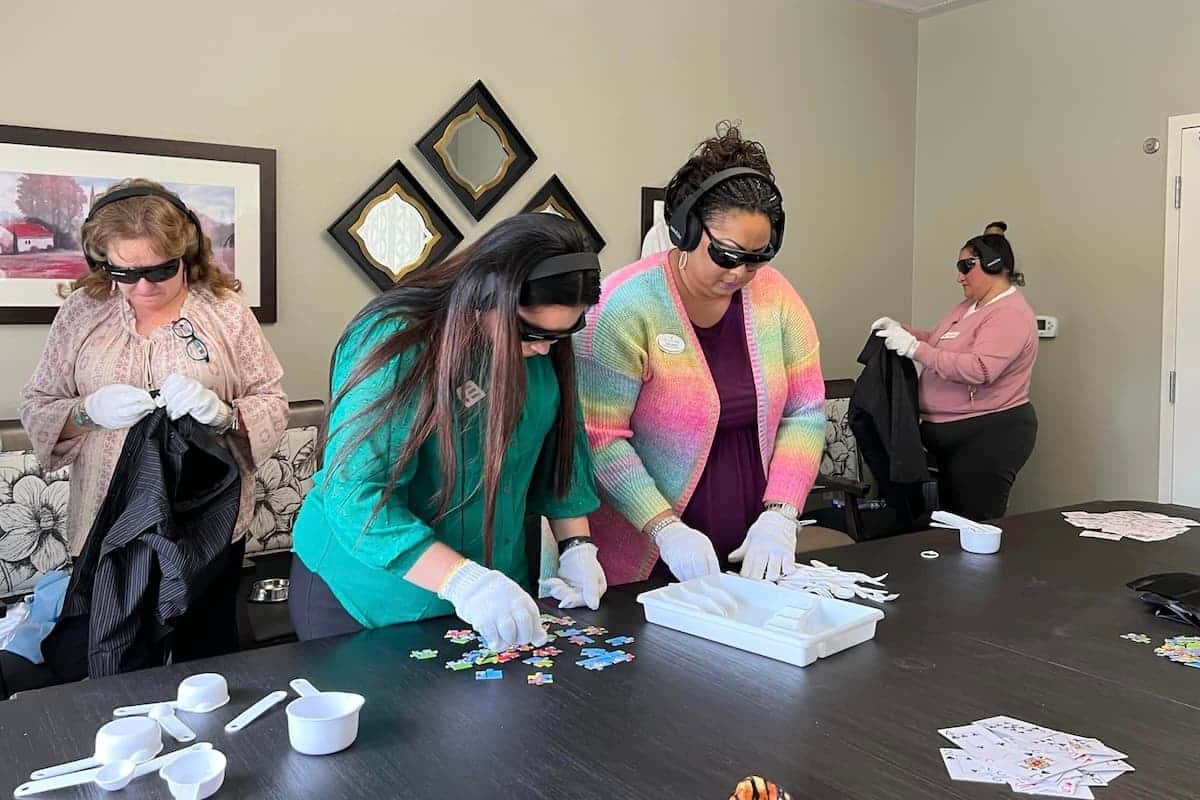Welcome to the Connections Memory Care Program
Considering memory care living arrangements for a loved one is a decision filled with emotions.
It’s a journey that requires empathy, understanding, and knowledge.

At Pegasus Senior Living, we’re changing the traditional nursing home and memory care unit models. Our evidence-based Connections memory care program brings an engaging and intentional approach to senior care centered on the concept of neuroplasticity.
“If you move, connect, and learn – in that order, you can get people to rebuild neural networks and live. And on some levels, improve,” says Pegasus CEO Chris Hollister. “That’s a bold claim, but we think it can slow the progression.”
Find Memory Care Near You
Alzheimer’s and Dementia Progression and Comorbid Conditions
Over 6 million Americans have Alzheimer’s, the most common form of dementia. Other types of dementia include:
- Frontotemporal dementia
- Vascular dementia
- Lewy Body dementia
- Mixed dementia
- Parkinson’s disease dementia
- Creutzfeldt-Jakob disease
- Huntington’s disease
- Wernicke-Korsakoff syndrome
Dementia progresses in stages, each with its own set of symptoms.
Early Stage (Mild)
In the early stages of Alzheimer’s and dementia, a person might have trouble remembering recent events or conversations. They may get lost easily, even in familiar places, and struggle with managing their finances or planning meals. Many withdraw from social activities because these challenges can be frustrating or embarrassing.
Middle Stage (Moderate)
As Alzheimer’s and dementia move into the middle stages, memory loss becomes more severe. A person might forget personal details like their address, phone number, or even the names of close family members. They may also need help understanding what they read or see on TV. Simple tasks like getting dressed or eating can become challenging. People in this stage might also start showing changes in personality, like becoming anxious, suspicious, or agitated.
Late Stage (Severe)
In the later stages of Alzheimer’s and dementia, a person may lose the ability to communicate and need help with basic daily activities like eating and bathing. They might not recognize themselves or their loved ones. Physical symptoms like difficulty walking can also become apparent.
What are comorbid conditions and comorbid dementia?
It’s critical to remember that everyone experiences Alzheimer’s and dementia differently. Some people progress through the stages quickly, while others may stay in one stage for a long time. Many individuals face additional complications as well.
- Comorbid conditions with dementia, like diabetes, heart disease, and hypertension, often coexist with dementia and complicate progression. These conditions require additional medical management and care strategies to ensure the individual’s well-being.
- Comorbid dementia can also present a unique set of challenges, as it involves the presence of more than one type of dementia simultaneously. This situation can lead to more complex symptoms and quicker progression through the stages, necessitating a multifaceted approach to care and treatment.
While these symptoms can be challenging to manage, therapies and services are available that can help manage them and improve quality of life.
Is it time for memory care?
Understanding Neuroplasticity and Dementia
Neuroplasticity is like the superhero power of our brain. Brains can change and adapt even as we grow older, forming new connections between brain cells. This principle is a vital breakthrough for people with Alzheimer’s and dementia.
Alzheimer’s creates disruption and gradually damages the connections in the brain. Eventually, it is nearly impossible for brain cells to communicate. Progression from the earliest stages leads to problems with:
- Memory
- Thinking
- Behavior
As dementia progresses, our brain’s superhero power, neuroplasticity, declines. However, promising evidence suggests staying engaged can extend this phenomenal process.
Researchers have used brain imaging to see this in action. When they asked people with early-stage Alzheimer’s to complete thinking tasks, they saw differences in brain activity compared to people without cognitive decline. The extra brain activity helped them perform better on the challenges.
It’s like the brain was working overtime to make up for the damage caused by Alzheimer’s.
This evidence shows that neuroplasticity isn’t just about the brain changing and adapting. It’s also about resilience and fighting back when faced with challenges.
Neuroplasticity can also be beneficial for other health issues. For instance, it can help people recover from strokes, address mental health conditions like depression, and even overcome addiction.
In all these cases, it’s about the brain’s ability to change, adapt, and keep going, no matter what.
This natural resilience in ourselves is crucial in those living with Alzheimer’s and dementia. Physical and mental activities and socialization can stimulate this process, creating new neural networks.
Discovering the Power of Brain Plasticity
Dr. Sandra Petersen, the mind behind Connections, discovered neuroplasticity firsthand.
After experiencing memory and mobility loss due to a stroke, she turned to neuroplasticity therapies. She learned a new language and took dancing lessons to engage in cross-body movements.
With over 30 years of experience in senior care and a passion for neuroscience, Dr. Petersen began applying these concepts to people with dementia.
Looking into the Connections Program
At Pegasus Senior Living, we wholeheartedly believe in the transformative power of purposeful creativity. We’ve seen firsthand how it can improve outcomes for those with memory conditions.
Our innovative approach combines cutting-edge science with heartwarming human connection, wrapped in engaging activities. Let’s explore three aspects of the program that helps seniors with dementia and/or Alzheimer’s.
1. SingFit in the Connections Memory Care Program
Music has a profound impact on our brains, and its benefits for cognitive health are immense.
The part of the brain that recalls music generally remains unaffected by dementia. We’ve incorporated SingFit, a neuroplasticity therapy that combines music with evidence-based techniques, into our program.
2. How Art Therapy Helps Seniors
Our art therapy program draws inspiration from artist Henri Matisse, who said, “There are always flowers for those who want to see them.”
Even when bedridden in his later years, Henri adapted his art to what his body would allow. Similarly, our program adapts projects to residents’ current abilities while encouraging brain challenges, body movement, and socialization.
Art can help those with dementia communicate and share reflections of themselves when they struggle to find words.
3. Connect – Move – Learn: Data-Based Memory Care Explained
We prioritize creating opportunities for residents to enjoy meaningful activities, engage socially, and stimulate minds. Each of these techniques play a crucial role in promoting neuroplasticity and slowing the progression of dementia.
As our Atlanta-area Director of Operations, Arlene Hsu, puts it: “Through this activity cycle, we are able to help residents engage in a way where they are connecting socially, spiritually, and physically. That is a huge piece when you are working through your day as someone living in memory care.”
Connect: Staying Social
Social interaction is not just about having fun – it’s also an excellent workout for your brain.
When we connect with others, it stimulates our brains to grow new connections between cells. This partnership maintains existing neural networks and helps delay the onset of dementia symptoms.
Being social can boost self-esteem and relieve stress, which is beneficial for overall brain health.
Move: Physical Activity with Cross-Body Movements
Physical activity, especially those involving cross-body movements, is essential for promoting neuroplasticity. These movements require coordination between both sides of the brain, encouraging communication between brain cells and forming new neural networks.
The brain is being kept active and improves mobility and balance, which can be affected by dementia.
Learn: Challenging the Brain
Just like a muscle, the brain needs regular challenges to stay strong. Mental activities like puzzles and learning new skills keep the brain active and stimulate the growth of new neural connections.
In the Connections program, we incorporate these elements into our daily activities. We believe connecting, moving, and learning create a positive and stimulating environment that supports brain health and enhances the quality of life for those with dementia.
How Does Senior Living Pricing Work?
Understanding Memory Care Cost
The cost of memory care facilities in the United States varies by location. From a 2023 health care article, on average, the monthly rent is around $6,935.
While this is more than the average cost of assisted living communities, the specialized care provided in memory care is crucial for those with Alzheimer’s and dementia.
Understanding the breadth of services and benefits included in the monthly rent can help families understand the cost better. Memory care communities cater to the unique needs of individuals with Alzheimer’s and other forms of dementia, providing not just medical care but a comprehensive approach to their overall well-being:
- Assistance with activities of daily living (ADLs)
- Personal care plan
- Nutritious chef-prepared meals
- Social and recreational activities
- 24/7 supervision
- Medical management
- Therapeutic programs
- Housekeeping and building/apartment maintenance
Discover Connections Memory Care Near You
Pegasus Senior Living is proud to offer a new approach to memory care living. We are grounded in research and compassion. Our assisted living and memory care communities support the growing population of older adults across the United States.
Our commitment to residents extends beyond providing a comfortable environment in our memory care communities. We strive to offer a life filled with joy, connection, and purpose.
For families considering memory care for a loved one, we invite you to learn more about our Connections program and how we’re flipping the traditional senior living model.
Contact a memory care community near you.
